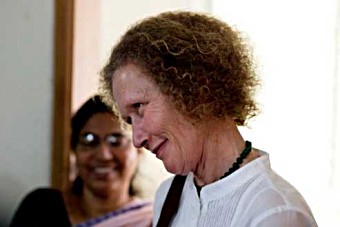
GAVI Deputy CEO Helen Evans in Dhaka, Bangladesh. Credit: GAVI/2011/Saiful Huq Omi.
In this special Q&A, GAVI’s Deputy CEO Helen Evans discusses the challenges and opportunities facing the Alliance after last June’s successful replenishment process.
The responses are based on Helen’s recent keynote address to the High-Level Forum on US Leadership in Global Health, hosted by the Center for Strategic and International Studies (CSIS) in Washington, DC on 3 December.
Helen was lead speaker on a discussion panel focused on overcoming obstacles to immunisation efforts. The panel also included Orin Levine of the Johns Hopkins University and GAVI Board member Anne Schuchat of the Centers for Disease Control and Prevention (CDC) and was moderated by Amanda Glassman of the Center for Global Development.
GAVI is coming out of a successful replenishment process with significant support from donors. What are the funding challenges that lie ahead?
As the demand for vaccines has grown and the complexity of our programmes has expanded, we must be able to do long-range planning with regard to programme financing and market-shaping.
CSIS High-Level ForumThe 2nd High-Level Forum on US Leadership in Global Health focused on the opportunities vaccines provide to improve health, strengthen economic and security interests and build partnerships. The daylong event covered vaccinology and the role of the private sector in supporting vaccines, and included keynote addresses by Dr. Anthony Fauci of the National Institutes of Health and USAID Administrator Rajiv Shah. |
The June conference in London was our first-ever replenishment process and thanks to the generosity of donor governments and the Gates Foundation we secured an additional US$ 4.3 billion in pledges.
Now we need to continue to work to turn those pledges into funding while making the case for investments in GAVI and national immunisation programmes, and continuing to work on shaping vaccine markets.
It’s vital to maintain trust among our donors that they are investing in the best buy in public health and that we’re delivering results. Since our launch in 2000, we estimate that our support has contributed to the immunisation of an additional 326 million children in the poorest countries.
But great challenges remain. Each year 130 million children are born and 19 million of those children go unimmunised; that’s over 80% in the poorest countries which GAVI supports. Almost half of those children are in India and Nigeria. In addition, 1.7 million children die of vaccine preventable diseases every year – that’s one child every 20 seconds.
What is GAVI doing to ensure that prices for vaccines, particularly vaccines that will be offered for the first time, are sustainable for developing countries?
The predictable demand for vaccines for developing countries that GAVI ensures attracts more manufacturers, which increases competition and attracts emerging market manufacturers in particular.
Two emerging market vaccine manufacturers have lowered prices for the life-saving pentavalent vaccine, which protects against five deadly diseases. In 2010 the weighted average price projection for pentavalent vaccine for 2011 dropped by almost US$ 0.40 per dose compared to the year before. This is important as pentavalent is a major cost driver for GAVI.
Pneumococcal vaccine offers another example of market-shaping through the Advance Market Commitment (AMC). This is one of several innovative finance products that allow us to encourage predictability and sustainability of markets and countries’ ability to continue supporting immunisation.
Donor commitments incentivise vaccine manufacturers to invest in vaccine research and development, while companies sign a legally-binding commitment to provide the vaccines at long-term affordable prices for developing countries.
What does GAVI see as the next most exciting opportunities in vaccines and immunisation over the horizon?
Rolling out HPV and rubella vaccines presents opportunities for us to support the health of women and children in new ways.
HPV causes most cases of cervical cancer. That’s 275,000 women dying each year from a vaccine preventable disease, one every two minutes, with 90% of them in developing countries.
Funding HPV vaccine is subject to negotiating an affordable price and country readiness but in the areas where the disease burden is greatest we can now provide this protection to girls and women who would otherwise have difficulty accessing screening and treatment.
Now that our Board has also approved the introduction of rubella vaccine, we will be involved both in measles and rubella elimination efforts, since the rubella vaccine is combined with measles vaccine. We will also be looking at ways that we can further synergise our efforts with our partners and the measles elimination initiative before any potential measles-rubella roll outs occur.
Measles is one example of ways we’re looking to work closely with others across the vaccine landscape and polio is another.
We need to consider not just the new inactivated polio vaccine but also the infrastructure involved in eradicating this disease. As with measles, where there are polio outbreaks, this reflects weaknesses in the immunisation system as a whole.
How does this fit into country capacity for supporting vaccines and immunisation?
Successful introductions of vaccines depend upon strong health systems. To date we’ve operated with more of a one size fits all approach and we’re now moving toward a customised approach for countries with a special approach for underperforming and fragile nations.
As Tony Lake (UNICEF Executive Director) has argued so passionately, country health systems need to be supported to reach the whole population, regardless of where people live, and the income of their parents – reaching the fifth child as he puts it.
What is the role of political will in overcoming challenges to immunisation?
Clear roles for ministries of health and finance and a sense of country ownership through co-financing of vaccines are enormously important.
The key to overcoming obstacles in countries is political will, and that will needs to start at the top. By giving countries opportunities to take credit for their successes in tackling child mortality we can help to generate that political will.
